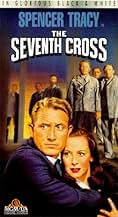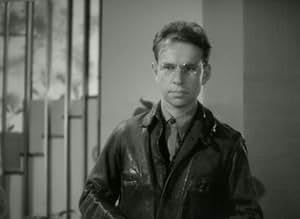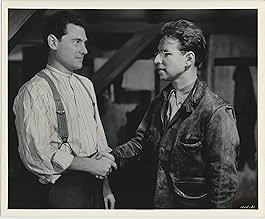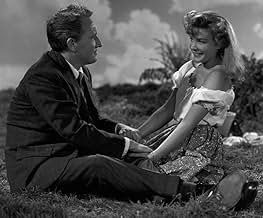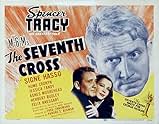AVALIAÇÃO DA IMDb
7,4/10
3,2 mil
SUA AVALIAÇÃO
Adicionar um enredo no seu idiomaSeven men escape from a Nazi prison camp. One makes it to freedom.Seven men escape from a Nazi prison camp. One makes it to freedom.Seven men escape from a Nazi prison camp. One makes it to freedom.
- Direção
- Roteiristas
- Artistas
- Indicado a 1 Oscar
- 3 vitórias e 1 indicação no total
- Direção
- Roteiristas
- Elenco e equipe completos
- Produção, bilheteria e muito mais no IMDbPro
Avaliações em destaque
This film stars Spencer Tracy as a concentration camp escapee named George Heisler who navigates his way to freedom through the perils of Nazi Germany. Along the way he meets many people who help him, and his cynicism and fatigue fade away. Early in the story, soon after he's left the camp, he meets a little girl, and in his mind he's sure that he'll kill her if she attracts the wrong kind of attention to him. Next he lurches into the home of his ex-girlfriend, frightening her. And no wonder, because his face has a twisted expression on it that frightened ME - in this moment Tracy is almost unrecognizable. This man's an animal, he's been through hell and he has no reason to believe that the world is anything other than a sewer. For my money this is a pretty startling opening for a 1944 movie.
Not to throw definitions around too freely, I'm tempted to describe this film as Nazi noir. Heisler weaves his way through German society of 1936, where it's the criminals who are in power, and scuttling through the streets are the folks who are merely trying to survive, in any way possible. At the back of our minds is the worrisome knowledge that things are going to get exponentially worse. Fred Zinnemann, the director, creates an atmosphere of claustrophobia and palpable dread where the night is filled with dark shadows and any tiny act of resistance to the Nazi regime is a colossal act of courage. There is almost no violence in the film, yet the threat of violence hangs heavy in the air. Hume Cronyn and Jessica Tandy play Paul and Liesel Roeder, a couple who are old friends of Heisler and who befriend him. Paul is politically neutral. He doesn't follow the news, and one gets the feeling that he would rather not know anything about what's going on. One of the fascinating threads in the film is his growing awareness. The scenes with Cronyn and Tandy are wonderful - real chemistry is bubbling here and they seem to belong together (and we all know what happened in real life). I must mention that George Macready and Agnes Moorehead are very good in small roles. There's considerable art and intelligence in "The Seventh Cross", and a preview of what was to come in Zinnemann's illustrious career.
Not to throw definitions around too freely, I'm tempted to describe this film as Nazi noir. Heisler weaves his way through German society of 1936, where it's the criminals who are in power, and scuttling through the streets are the folks who are merely trying to survive, in any way possible. At the back of our minds is the worrisome knowledge that things are going to get exponentially worse. Fred Zinnemann, the director, creates an atmosphere of claustrophobia and palpable dread where the night is filled with dark shadows and any tiny act of resistance to the Nazi regime is a colossal act of courage. There is almost no violence in the film, yet the threat of violence hangs heavy in the air. Hume Cronyn and Jessica Tandy play Paul and Liesel Roeder, a couple who are old friends of Heisler and who befriend him. Paul is politically neutral. He doesn't follow the news, and one gets the feeling that he would rather not know anything about what's going on. One of the fascinating threads in the film is his growing awareness. The scenes with Cronyn and Tandy are wonderful - real chemistry is bubbling here and they seem to belong together (and we all know what happened in real life). I must mention that George Macready and Agnes Moorehead are very good in small roles. There's considerable art and intelligence in "The Seventh Cross", and a preview of what was to come in Zinnemann's illustrious career.
Seven prisoners escape from a German concentration camp, and the Nazi commander vows to capture and crucify all of them. One by one they are captured in some harrowing scenes and put up on the crosses outside the camp. The seventh cross, already placed, awaits the final escapee - played by a desperate Spencer Tracy. The fear and claustrophobia of being trapped, even as an escapee, inside Nazi Germany is easily seen through Tracy's able eyes. Most notable is the German couple that eventually aids Tracy despite their fear; they are played touchingly by the famous husband and wife team of Hume Cronyn and Jessica Tandy, two of the great actors of our age. Signe Hasso plays a lovely but lonely maid with whom Tracy and she have a touching emotional connection. The hope symbolized by the couple and the maid within the darkness of Nazi Germany is at the core of the film. The issue of Tracy's escape - or non-escape - is almost irrelevant by then: the glimmer of humanity is seen even among the German people. Despite the apparent pessimism of the film, it is optimistic at its heart. And it is charming and beautifully done. Not to be missed.
I familiar with Zinnemann's last five movies and am a great fan of his last one "Five days one summer", which has received more undeserving brickbats than bouquets from some wellknown critics. It is evident to me that Zinnemann was more 'sinned against than sinning.' After seeing "The Seventh Cross", I am convinced that this man was never given given his due recognition because he was so different from his peers.
The story of "The Seventh Cross" is narrated by a dead man. For us in the current decade having seen films like "The Others" such a script as this one is not uncommon. But in the Forties, this must have been groundbreaking.
The casting is superb. Spencer Tracy is fascinating and a superb choice. This is one of his finest performances--because he does not speak much--just like "Bad Day at Black Rock."
Agnes Moorehead appears for a few minutes but presents a delightful character that adds to the strength of the film. I thought Russ Tamblyn was the acrobat who does not speak a single line but the IMDb records indicate that I am mistaken. Was I? Hume Cronyn and Jessica Tandy were a delight to watch as always. The character of Signe Hasso (Toni) is probably the least appropriate character in the film but one guesses that necessity for a love interest for the lead character in a film like this.
For me the actors played a major part in making the film a wonderful viewing experience. But the real contributors to making the work impressive were Zinnemann and the cinematographer Karl Freund. The opening sequence showing the faces of the escapees establish the credibility of the two gentlemen behind the camera. The camerawork of Freund is always interesting but this film shows the chemistry between director and cinematographer.
Zinnemann's choice of subjects to film has always made me wonder about the man. It is evident that he was a very sensitive person who valued great ideals. He was probably heartbroken that his last film was not accepted as much as his other work based on popular novels and plays.
The story of "The Seventh Cross" is narrated by a dead man. For us in the current decade having seen films like "The Others" such a script as this one is not uncommon. But in the Forties, this must have been groundbreaking.
The casting is superb. Spencer Tracy is fascinating and a superb choice. This is one of his finest performances--because he does not speak much--just like "Bad Day at Black Rock."
Agnes Moorehead appears for a few minutes but presents a delightful character that adds to the strength of the film. I thought Russ Tamblyn was the acrobat who does not speak a single line but the IMDb records indicate that I am mistaken. Was I? Hume Cronyn and Jessica Tandy were a delight to watch as always. The character of Signe Hasso (Toni) is probably the least appropriate character in the film but one guesses that necessity for a love interest for the lead character in a film like this.
For me the actors played a major part in making the film a wonderful viewing experience. But the real contributors to making the work impressive were Zinnemann and the cinematographer Karl Freund. The opening sequence showing the faces of the escapees establish the credibility of the two gentlemen behind the camera. The camerawork of Freund is always interesting but this film shows the chemistry between director and cinematographer.
Zinnemann's choice of subjects to film has always made me wonder about the man. It is evident that he was a very sensitive person who valued great ideals. He was probably heartbroken that his last film was not accepted as much as his other work based on popular novels and plays.
This film has one of the most unusual styles of the day. In many ways, its narration by Ray Collins is very reminiscent of the narration by William Holden in SUNSET BOULEVARD. That's because like Holden, Collins is dead and gives the narration post-mortum! A strange plot device but very effective for this sort of film.
THE SEVENTH CROSS is a propaganda film meant to solidify the people back home in the war effort against Nazi Germany. However, the film is set in 1936--three years before the war began. The film finds seven political prisoners escaping from a concentration camp. The whole "seven crosses" reference regards the Commandant's (George Zucco) pronouncement that each of the seven men will be tracked down and hung from these crosses in the courtyard of the prison until they are dead--as a lesson to all those who would dare to consider escaping.
The main character of the film is Spencer Tracy. What makes this performance interesting is that he says almost nothing through much of the film. Collins narrates and things occur around Tracy, but he's so hollow and beaten by life in the camp that he just stares with a somewhat vacant look. As the film unfolds, his performance opens up as well--showing more and more of the familiar Tracy as he slowly recovers from the agonies of his confinement.
The rest of the cast is quite impressive. Many exceptional character actors (such as Felix Bressart, Hume Cronyn and his wife Jessica Tandy, Agnes Moorehead) were gleaned from the MGM roster for the film. Additionally, if you look at the extended list of the cast, you'll see that it is huge---much, much larger than usual. It's obvious that the studio pulled out all the stops to make this a first-rate production.
Overall, a very successful film because unlike some wartime films, this one is timeless and can be enjoyed and admired today because it is a very well made film--with a taut script and excellent acting. As I said, some wartime propaganda films don't work as well today because they are shrill and simplistic. This film has depth and has more to offer than usual.
THE SEVENTH CROSS is a propaganda film meant to solidify the people back home in the war effort against Nazi Germany. However, the film is set in 1936--three years before the war began. The film finds seven political prisoners escaping from a concentration camp. The whole "seven crosses" reference regards the Commandant's (George Zucco) pronouncement that each of the seven men will be tracked down and hung from these crosses in the courtyard of the prison until they are dead--as a lesson to all those who would dare to consider escaping.
The main character of the film is Spencer Tracy. What makes this performance interesting is that he says almost nothing through much of the film. Collins narrates and things occur around Tracy, but he's so hollow and beaten by life in the camp that he just stares with a somewhat vacant look. As the film unfolds, his performance opens up as well--showing more and more of the familiar Tracy as he slowly recovers from the agonies of his confinement.
The rest of the cast is quite impressive. Many exceptional character actors (such as Felix Bressart, Hume Cronyn and his wife Jessica Tandy, Agnes Moorehead) were gleaned from the MGM roster for the film. Additionally, if you look at the extended list of the cast, you'll see that it is huge---much, much larger than usual. It's obvious that the studio pulled out all the stops to make this a first-rate production.
Overall, a very successful film because unlike some wartime films, this one is timeless and can be enjoyed and admired today because it is a very well made film--with a taut script and excellent acting. As I said, some wartime propaganda films don't work as well today because they are shrill and simplistic. This film has depth and has more to offer than usual.
While watching this film, I was under the impression that it had been made in the early 1950s and was amazed and impressed to see that it dates from 1944. Although not all the film's messages intertwine as neatly as they might, it is - overall - a great success. It seems surprisingly long for a film of its era as well, though it does not drag on the whole. Spencer Tracy gave me some clue in this role why he is considered to be such a great actor (you actually see his face change as he recovers from the near animal state the concentration camp had reduced him to) and Hume Cronyn and Jessica Tandy also put in top class performances. The depiction of the concentration camp is astoundingly vivid for the time, with the theme of seven crosses for either displaying the corpses of the escapees or for putting them to death being especially grim and - as the allies were soon to find out - no exaggeration as a symbol of the evil the Nazis visited upon millions who fell under their jackboot. Modern audiences may feel somewhat ambivalent about the idea of one of Tracy's dead friends from the camp acting as a voice within his soul, but I think even those not of a spiritual bent ought to concede it is depicted with a light touch that does not damage the film.
Você sabia?
- CuriosidadesFirst joint film appearance of real life couple Hume Cronyn and Jessica Tandy.
- Erros de gravaçãoWhen the escapees are being hunted, the only uniformed personnel we see chasing them are the 'Storm troopers' (Sturmabteilung) or SA. Even before the 'night of the Long Knives', the SA would not have been the only group to search for escapees & by 1936, the hunt would also have been carried out by the regular police and the Schutzstaffel (SS).
- Citações
George Heisler: There are no better men than Paul Roeder.
- Versões alternativasThere is an Italian edition of this film on DVD, distributed by DNA srl, "LA SETTIMA CROCE (1944) + THE SEARCH (Odissea tragica, 1948)" (2 Films on a single DVD), re-edited with the contribution of film historian Riccardo Cusin. This version is also available for streaming on some platforms.
- ConexõesFeatured in Twenty Years After (1944)
Principais escolhas
Faça login para avaliar e ver a lista de recomendações personalizadas
- How long is The Seventh Cross?Fornecido pela Alexa
Detalhes
Bilheteria
- Orçamento
- US$ 1.300.000 (estimativa)
- Tempo de duração1 hora 52 minutos
- Cor
- Proporção
- 1.37 : 1
Contribua para esta página
Sugerir uma alteração ou adicionar conteúdo ausente

Principal brecha
By what name was A Sétima Cruz (1944) officially released in India in English?
Responda

